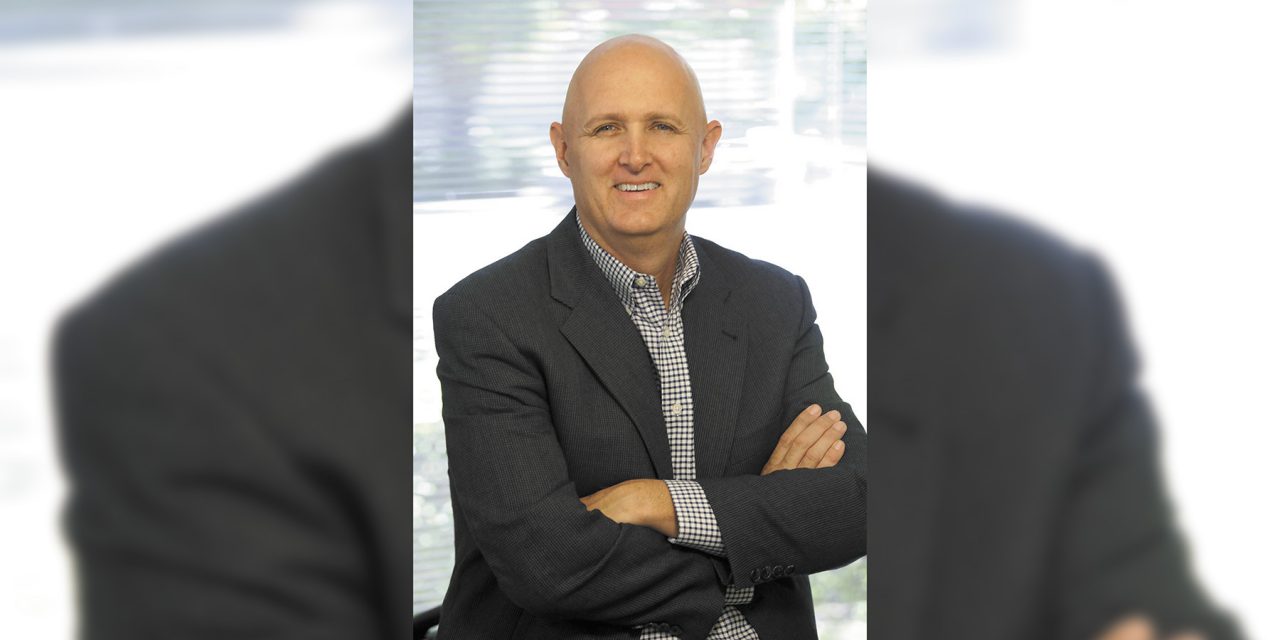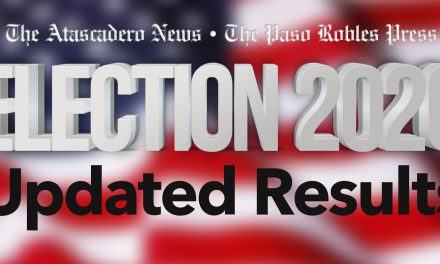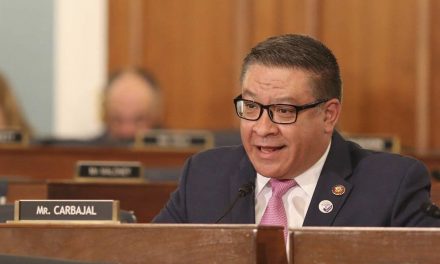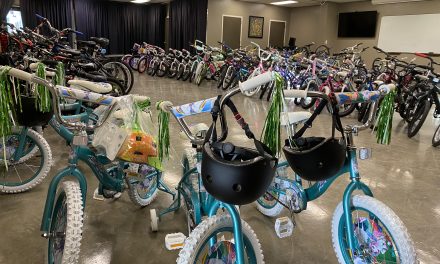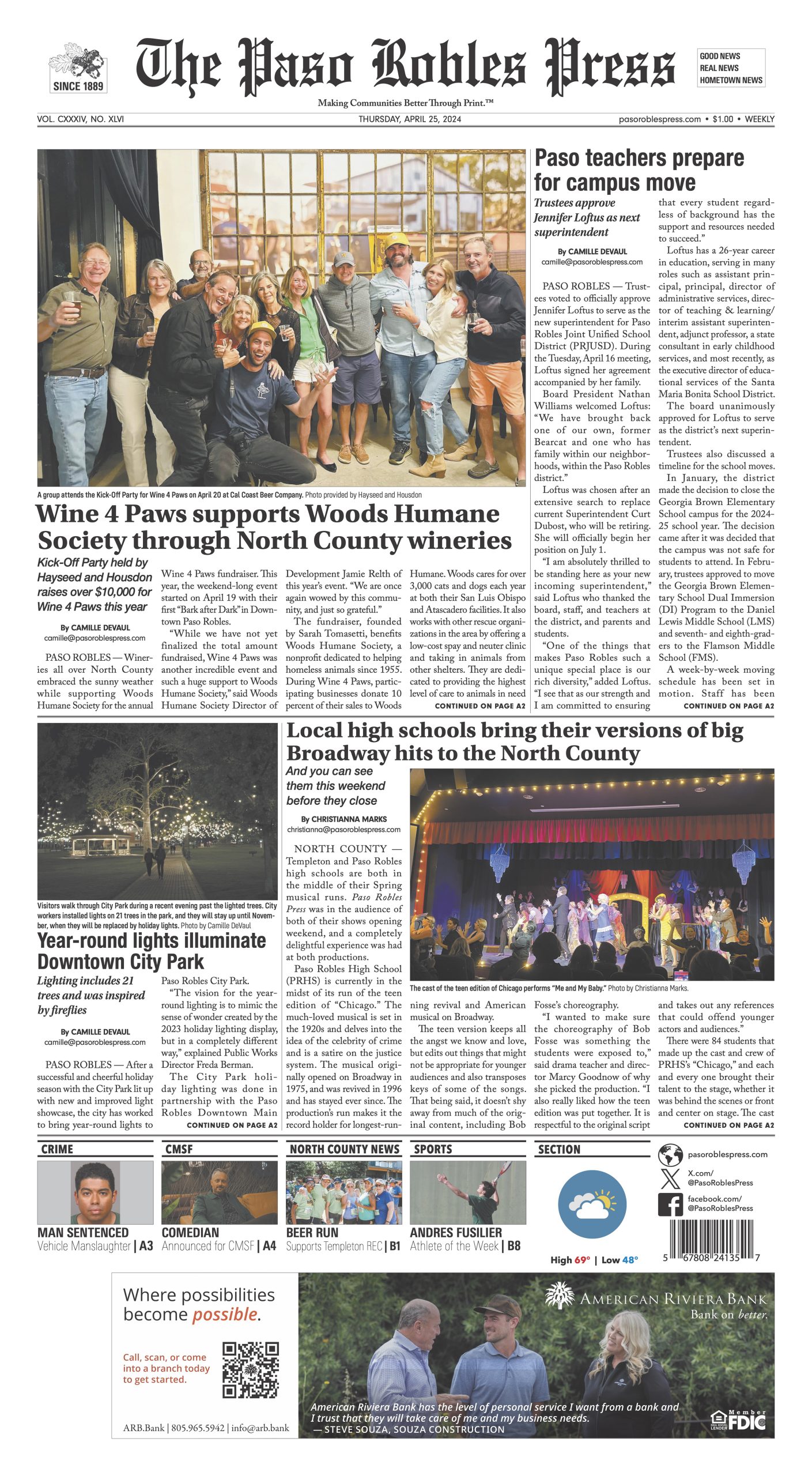The Paso Robles Press sat down with San Luis Obispo County District 1 Supervisor incumbent for a Q & A on local issues
PASO ROBLES PRESS: What is your campaign slogan?
JOHN PESCHONG: I believe in smaller, more efficient government, lower taxes and personal freedom. So the smaller, more efficient government, you know, we have 2,900 county employees. Actually, we’re down to 2,700 thereabouts through attrition, there’s always a fluctuation of people, open positions. But I always believe that smaller government that’s closer to the people works better, it’s stronger. I don’t buy into the philosophy that government should be all things to all people and do things for everybody. And I think that you can see that in the governments of Paso Robles and Atascadero too is that they try to do the same thing. So that’s the first one, if you want more expanded programs, I’m not the guy you should vote for.
PRP: What is your campaign platform?
JP: Those three things, smaller more efficient government, lower taxes and personal freedom are my platform.
Policy
PRP: What one part of the County government would receive more attention if you were elected?
JP: The two are public works and the department of building and planning. And the reason is because they both actually work on water issues in the Paso Robles Basin, which is, I believe, the main reason I was elected three-and-a-half years ago, to write basically the sustainability plan and get that submitted. They said “We couldn’t get it done, we were fighting.” We formed a cooperative committee with the City of Paso Robles, the Shandon/San Juan Water District, the CSD in San Miguel and the County and we were able to get it done.
PRP: If elected, do you plan to promote any changes to existing taxes? If so, why?
JP: I do. I said earlier, I’d love to but I can’t find three votes to cut the salaries of the supervisors, it’s going to be tough, so let’s not use that one as the example. There are fees that come before the board and I have supported some fees in the past. Most of the fee increases that have come before the board have not been fee increases, they’ve been status quo or cuts. There’s things that, as we progress as a society, have changed. Like the County used to charge a dollar a page to fax things to people. Well nobody faxes anymore, it’s email. So we’re able to eliminate fees that way, on different documents and things like that.
PRP: What do you see as the most pressing needs for infrastructure or capital projects in the county?
JP: Certainly roads. We actually added, the board majority, Debbie, Lynn and I, added that onto the goals of the County, it’s the number four and it wasn’t there before. We’ve really hit some roads in my district. I’ll give you an example, it would be Santa Rita Road, real problems with that. We’ve gotten a hold of that and I actually think we’ve done that. Ranchita Canyon is one that we’re working on actually right now. My big grandaddy road is Bitterwater Road which is almost out to Cholame and I drove it again this weekend and the potholes are enormous, just big potholes in the middle of the road.
Industry, Economy & Jobs
PRP: What is your industry, economy & jobs forecast for our area of SLO County?
JP: I think that we’re doing very well right now, I think the economy is working pretty much throughout California, it’s a very strong economy, and throughout the country. I do think though with the closure of Diablo there is some storm clouds on the horizon. We’ve invested a lot of money and time into a couple of organizations. There’s the Economic Vitality Corporation. And the goal is to be able to really build them out to be able to support the economic vitality of our region. Melissa James, her organization is really focused on working down at Vandenberg Air Force Base and the kind of space, the private, I guess, corporate space entities are expanding and looking forward to expanding.
PRP: With respect to the closing of Diablo Canyon, what are our most significant opportunities for developing stronger industry for our North SLO County to compensate for economic losses?
JP: A lot of those folks there are nuclear engineers, a lot of them have a military background, they come into our county to take those highly skilled jobs. As 2025 comes along and they actually close it down, there’s going to be so much cleanup there for so long. The biggest fear I have is — you’ve got the federal government decided to build Yucca mountain years ago and be able to take the nuclear waste, the spent fuel rods and move it there. Well now, the State of Nevada says you can’t open Yucca Mountain, so we as taxpayers of course spent a billion dollars now on a really great storage facility that can never be used.
Cannabis in North SLO County
PRP: What is your position with regards to the cannabis industry in the North SLO County?
JP: We did pass a ordinance in the county. It did a number of things. It does not allow for brick and mortar cannabis stores in the community. I did a tour of the City of Boulder, Colorado with the chamber of commerce and we really learned a lot from those folks and the trials and tribulations of that. We allow delivery service in the county as long as they work through the permitting process with the state and the county government. The ordinance does allow manufacturing, the ordinance does allow for some cannabis growing.
PRP: How would your presence on the BoS impact future decisions about the cannabis industry?
JP: I will continue to fight against the brick and mortar cannabis dispensaries, especially when the City of Atascadero and the City of Paso Robles said no. Then there are people that approach me and say, “We want to put one right outside the city limits.” I think if you have delivery service people have access to adult use of cannabis. So my opinion is not going to change. I look at it as an agricultural crop, it is only allowed right now on agricultural lands and rural lands, we don’t allow it in residential lands. The six plants that’s guaranteed by the state law Prop 64 which I did not support and did not vote for though it’s the law and the rule of law and I have to follow that.
Housing
PRP: What is the County’s opportunity for creating or improving affordable housing in our area, and how would your work on the BoS address our future housing needs?
JP: The 70 percent, to me, of people’s take home pay that they’re putting toward their housing costs, is unacceptable. I think that if we can lower that to 50 percent to a third of their take home, and figure out ways to get them into a house, I think that would be the ultimate goal. We’ve done a number of things, we passed the ADU units – Auxilary Dwelling Units – and that was done two weeks ago. We’re working on farm worker housing, that’s coming up here. That will get people actually out of, I think, apartments in like the City of Paso, and be able to get them, if we can do this, out onto the land.
Water
PRP: What is the biggest threat to our local water supply, and what can be done to protect/preserve/improve it?
JP: I think the biggest threat is the watering of crops. We have 44,000 acres of grapes and I think that a lot of people are just scared. If you look at the plan we put together removes the de minimis users from that — and the Department of Water Resources wants us to have in the ordinance some sort of cutback until we come into sustainability. There was originally some discussion that it would be 60 percent cutback. That would destroy the economy of the North County if you have to do that. So I don’t believe that’s the case.
Traffic
PRP: What is the BoS role in improving the QoL on our roads as it relates to general traffic and road quality?
JP: Most of the traffic discussions are about the 101 down in the Pismo Beach area and then 227 coming out of the City of San Luis. For me, it’s safety here in the North County. As you know, the governor about four months ago, decided to take $15 million that had been pledged to the Antelope Grade, which is just the 46/41 where they meet. The Antelope Grade goes up toward Bakersfield and that was going to widen it … he took it and moved it out to the train in the Central Valley. So I sent a letter the California Transportation Commission and so did Jordan Cunningham and so did a number of people including Fred Strong, council member from Paso, and we were able to get $10 million restored but we’re still missing $5 million.
Tourism
PRP: Globally, tourism has led to problems that have motivated many cities to apply limits or reassess the approach to tourism promotion. How can we balance our economic dependence on tourism with the quality of life we enjoy?
JP: It’s a great question and they’re having that discussion in a number of cities because of vacation rentals, right? And if I make this a vacation rental am I taking this out of the housing world where I could be housing a family? My belief is that yes, there are problems sometimes with tourism but I believe that the benefits outweigh those problems. We could fix the problems. If we know what they are, we can alleviate some of those problems. Traffic in the South County is obviously one of them. But the one thing that people need to remember … the wineries, are the reason why we actually survived as a community.
Management
PRP: When managing public agencies, is it better to have more employees at a modest wage, or fewer employees at a wage high enough to attract and retain quality applicants?
JP: I actually think that we have modest wages here in San Luis Obispo County for county employees. Attracting new folks is the toughest thing because we are competing against other counties and the Sheriff’s Department is the prime example. One of my campaign promises last time was two additional sheriff’s deputies for the North County. We’d just got the gentleman who had signed on board and went through the academy, he’s out in Shandon now every day and he’s doing a spectacular job. But it was very tough to find these folks because we’re recruiting against Fresno County, L.A. County and Orange County.
Closing
PRP: What is the greatest concern facing our County now or in the near future? What is the solution?
JP: The greatest concern I have is that the State of California and the Department of Water Resources does not accept our plan and they come in and take over our water basin, the Paso Robles Basin. My plan, I actually went and met with the Department of Water Resources in Sacramento before we submitted the plan and got them to understand our thinking behind it and how we built an organization of cooperation between the city, the county and the private water district and the CSD and how we all came together on this to know this is the best way to be able to manage this basin.
PRP: If elected, what are your goals for the term?
JP: Two goals, and I’m only running for one more term if I am blessed to be elected, I will not be running for a second term and I’m telling you this so you can hold me accountable. I think that the goal here, the sustainability plan and the basin and the Paso Robles Basin, that’s number one. Number two is homelessness. So I’ve walked a number of precincts, going door-to-door knocking on doors during this campaign. Knocking on doors and talking to people. And the number one issue is the homeless problem. So I’m going to focus all my energy making sure we work with ECHO to be able to build the Paso Robles shelter and get the people out of the river.
PRP: How do those goals affect the next 5-10 years of our region?
JP: In Sacramento, so they feel the heat from constituents [concerning homelessness] … you know they take all our tax dollars, we want them all coming back into these programs. All of these things have been a 5-0 vote, they’re all focused on being able to help this group of folks. Especially with 40 Prado, that really brought everybody together. We’ve had a decrease over the last seven years of the number of people homeless in this county, but from the last Point in Time count we went up, I think another 200. So it’s fluctuating.
PRP: If elected, how does your presence change the dynamic of the BoS and lead to the accomplishment of your goals for our region, and the improvement of our county’s future?
JP: As you know, I was kind of the mover and shaker with the seven city mayors to be able to institute the civility code for the board of supervisors. I think I have changed the way that we deal with the public. It was not necessarily how we deal with each other, the five, because we’re five dynamic people that have their own constituencies. My district tends to be the most conservative district, I believe, that I represent. Bruce Gibson’s tends to be the most liberal district, he represents that. We have to find common ground. I think the civility code allowed us to begin to have those dialogues. I’m going to continue to do that.

